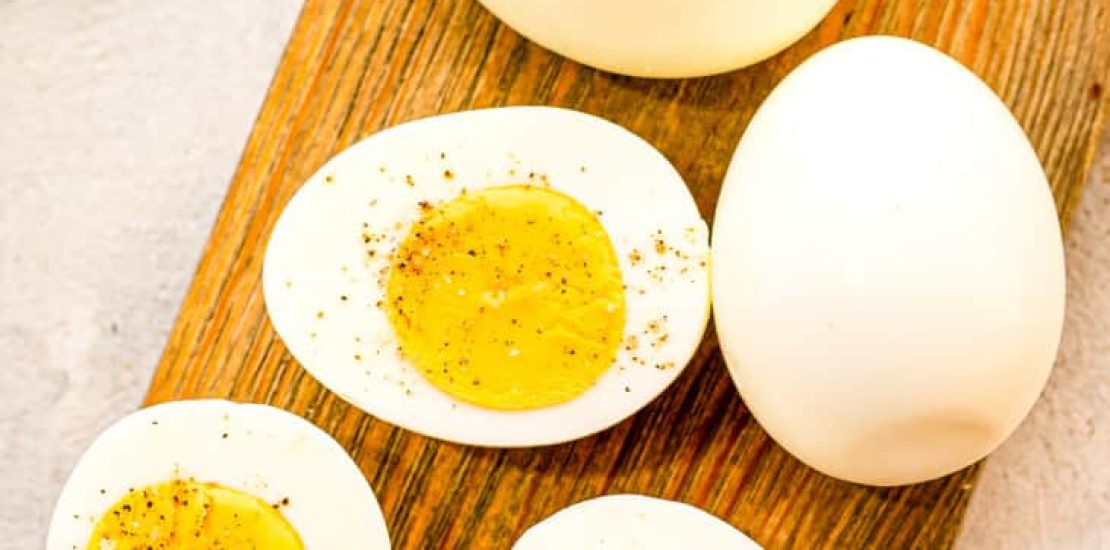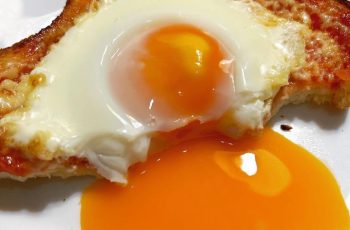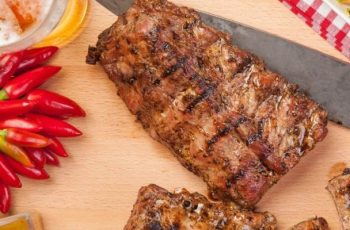Certainly, you can use an air fryer to make hard-boiled eggs with a slightly different texture than traditional boiling. Here’s a simple recipe and some notes to help you achieve the desired results:
Air Fryer Hard Boiled Eggs Recipe:
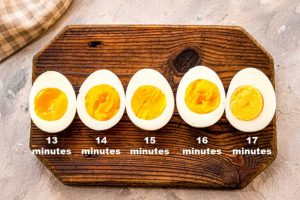
Ingredients:
- Eggs (as many as you’d like)
- Cooking spray or oil (optional)
Instructions:
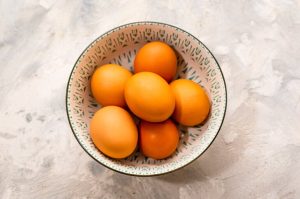
- Preparation:
- Start by selecting fresh eggs that are not cracked. You can use as many eggs as you want, but make sure they are arranged in a single layer in the air fryer basket.
- Preheat the Air Fryer:
- Preheat your air fryer to 250°F (120°C). This lower temperature helps prevent the eggs from cracking due to a sudden change in temperature.
- Place the Eggs:
- Once the air fryer is preheated, gently place the eggs in the air fryer basket. You can place them directly on the basket, or you can use a trivet or silicone egg holder to prevent direct contact with the basket.
- Cooking:
- Cook the eggs in the preheated air fryer for about 15-18 minutes. The exact time can vary depending on the size of the eggs and the specific air fryer model. Cooking times are usually longer than boiling due to the lower temperature used.
- Ice Bath:
- After the cooking time is up, carefully remove the eggs from the air fryer and immediately transfer them to an ice water bath. This helps stop the cooking process and makes it easier to peel the eggs.
- Peeling:
- Once the eggs have cooled in the ice water for a few minutes, gently tap them on a hard surface to crack the shell, then peel the eggs under running water. The air fryer cooking method might result in eggs with slightly different peeling characteristics compared to traditional boiling.
- Serve or Store:
- Your air fryer hard-boiled eggs are now ready to be eaten or used in your favorite recipes. You can store them in the refrigerator for up to one week.
Notes:
- Egg Size and Freshness: The size of the eggs and their freshness can affect cooking times and results. Larger eggs might need slightly more time, and fresher eggs can sometimes be more challenging to peel regardless of the cooking method.
- Experimentation: Since air fryer models can vary in terms of temperature accuracy and airflow, you might need to experiment with the cooking time and temperature settings to achieve your desired level of doneness.
- Cooking Spray or Oil: Some people find that lightly coating the eggs with cooking spray or oil before air frying can help prevent the shells from cracking during cooking. However, this step is optional.
- Texture: Air-fried hard-boiled eggs might have a slightly different texture compared to traditional boiled eggs. They could be creamier due to the lower cooking temperature.
- Egg Holders: Using trivets or silicone egg holders in the air fryer can prevent direct contact with the hot surface and potentially reduce the risk of cracked eggs.
Remember that using an air fryer for hard-boiled eggs is a bit of an unconventional method, so results might vary. It’s a good idea to do a small batch first to understand how your specific air fryer works with eggs.
Of course, here are some additional tips and information to help you make the best air fryer hard-boiled eggs:
Egg Freshness:
- Using eggs that are a little older (about 1-2 weeks) can make them easier to peel, regardless of the cooking method. Fresh eggs tend to cling more tightly to the membrane, which can make peeling more challenging.
Cooking Time Adjustments:
- Since air fryer models can vary in terms of their heating elements and airflow distribution, you might need to adjust the cooking time based on your specific air fryer. If your first batch doesn’t turn out perfectly, don’t be discouraged—try adjusting the time in subsequent batches.
Temperature Variations:
- Some air fryers might have slightly different temperature readings compared to the set temperature. It’s a good practice to use an oven thermometer to check the actual temperature inside the air fryer and make adjustments as needed.
Cooking Multiple Batches:
- If you’re cooking multiple batches of eggs, make sure to let the air fryer cool down a bit between batches. Rapid heating can cause eggs to crack as they undergo a sudden temperature change.
Yolk Doneness:
- The cooking time provided in the initial recipe should yield a fully cooked yolk, similar to a traditional hard-boiled egg. If you prefer a slightly softer yolk, you can experiment with reducing the cooking time by a minute or two.
Seasoning and Flavors:
- You can add a touch of flavor by sprinkling some salt, pepper, or your favorite herbs onto the eggs before cooking. This can infuse subtle flavors into the egg whites.
Egg Sizes:
- If you’re using eggs of varying sizes, try to select ones that are similar in size to ensure even cooking. You might need to remove smaller eggs earlier if they finish cooking before the larger ones.
Monitoring:
- Keep an eye on the eggs during the cooking process, especially the first time you try this method. This will help you understand how your air fryer behaves with eggs and allow you to make adjustments if necessary.
Egg Variations:
- While the main focus of this recipe is on hard-boiled eggs, you can experiment with other egg variations. For instance, you could try making soft-boiled eggs with a shorter cooking time or even attempt “fried” eggs in the air fryer.
Remember that air fryers are quite versatile, and you can adapt different cooking techniques to achieve your desired results. As you gain experience with air frying eggs, you’ll develop a better understanding of the ideal settings for your specific air fryer model and your personal preferences. Happy air frying!
